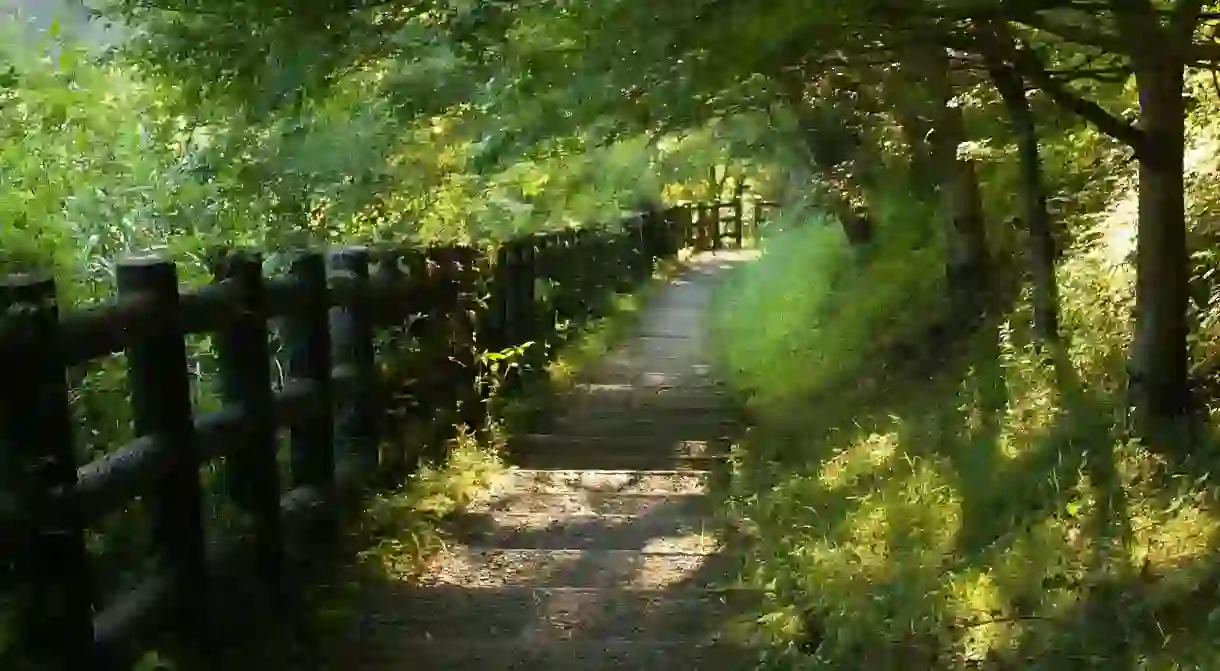7 Reasons to Hike the Kumano Kodo, an Ancient Pilgrimage Trail in Japan

Hiking the Kumano Kodo is like taking a walk through history. The trail is over 1,000 years old and was once a place of religious pilgrimage. Monks would tread through forests and scale mountains to reach holy sites, many of which are still standing. There are many reasons to follow their footsteps on this trail, which has been pristinely preserved and is still walkable.
The Kumano Kodo is actually a vast network of many connected trails. Hiking the entire route would take days. However, there are options that allow hikers to walk as much or as little of the trail as they please, as well as ways to skip the rugged road altogether and go straight to the attractions that draw pilgrims and tourists to this day. Whether you navigate the trail on foot or via public transit, below are the best reasons to experience the Kumano ancient road.

Visit the temple town of Koyasan
This tranquil village is located high up in the mountains and is serene in its seclusion. Koyasan is the headquarters of a sect of Buddhism called Shingon and is one of the holiest sites on the trail. It is said that the spirit of the founding monk of Shingon, Kobo Daishi, still prays for world peace in a temple in Okunoin, the largest cemetery in Japan.
Okunoin, 1-3-2 Koyasan, Koya, Ito-gun, Wakayama, Japan

See majestic Nachi Falls
This is Japan’s tallest waterfall and the backdrop of numerous travel photos, because it’s just that picturesque. There is an orange pagoda in nearby Buddhist temple Seigantoji that is a great addition to the foreground of a photograph. Not only are the falls are a gorgeous sight, but the natural feature has also long been venerated as a holy place guarded by gods.

Enjoy swimming and onsen at Shirahama Beach
Known as one of the best beaches in western Japan, Shirahama is also home to outdoor onsen, surreal rock formations, and a subterranean shrine. Sakinoyu, the most famous local onsen, is one of the country’s oldest hot springs and offers bathers views of the sea. The incredible natural wonders of this town draw millions of visitors every year, yet the beach is only crowded during the months of July and August.

Indulge in traditional culture at Yunomine Onsen
This tranquil town is full of Japanese inns built around a wealth of natural hot springs. Pilgrims used to stop here and perform purification rites. Today, the hot springs are still known for their healing effects.
Yunomine Onsen, Hongucho Shimoyukawa, Tanabe, Wakayama, Japan

Take a tour of the Dorokyo Gorge
This 31-kilometer-long (19 mi.) ravine is an excellent sightseeing spot as well as a haven for adventurers. The cliffs and unique rock formations have designated Dorokyo Gorge as a beloved natural monument. Activities include rafting and boating, both traditional Japanese-style and modern, allowing visitors an up-close view of the towering precipices that overlook the river.

Behold some of Japan’s best shrines
The Kumano Kodo was originally created to connect the Kumano Sanzan, the three great Shinto shrines of Kumano. Hongu Taisha is the main Kumano shrine in Japan and home to the world’s largest torii (shrine gate), Nachi Taisha is near the waterfall of the same name and the hot spring resort of Katsuura, and Hayatama Taisha houses an important site from an ancient creation myth. They are all located in the southeast of Wakayama Prefecture and can be reached on foot or as a day trip by booking a bus tour.

Experience one of the best hikes in Japan
Hiking the Kumano Kodo can be customized to the traveler’s liking. One can hike long stretches for days at a time, camping or staying at traditional inns along the way, or simply do a day hike. These vary from strenuous mountain hikes to quaint forest walks. The scenery also varies; hikers stroll along leaf-strewn paths, cobblestone walkways, and even through golf courses and parking lots (thanks to modern development). It’s difficult to find a more diverse or picturesque hiking experience anywhere else in the nation. It’s no wonder that this is one of only two pilgrimage trails in the world to be a UNESCO World Heritage Site.

Check out the trail’s official website for a list of suggested hikes and travel itineraries.













